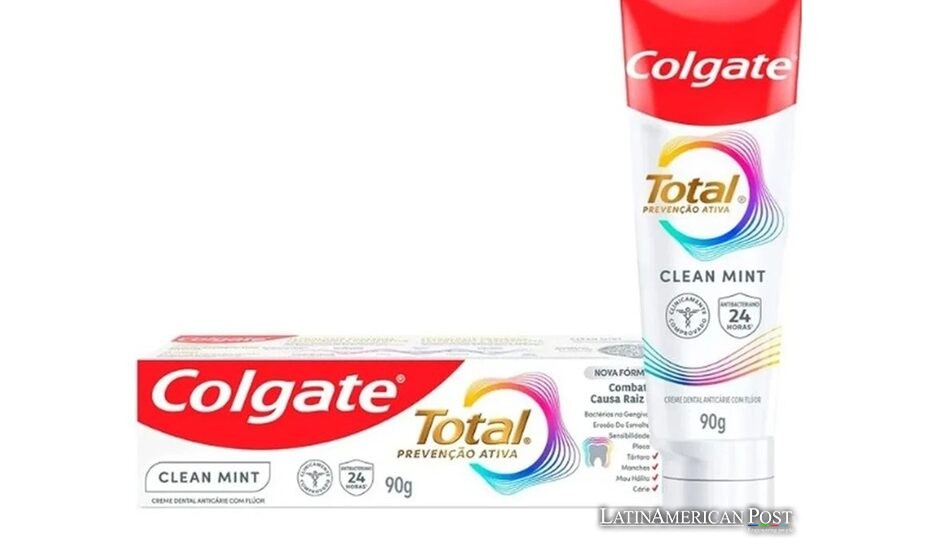Brazil Blocks Colgate Toothpaste Product as Alarming Consumer Reactions Emerge

Consumer complaints increased suddenly in Brazil. This increase caused regulators to act against a common Colgate toothpaste. The sale of the product stopped after reports of bad reactions. That stoppage raises questions about safety rules. Because of the action, shoppers feel unsettled – like those watching the industry.
A Surge of Complaints and Official Suspension
Brazil’s national health surveillance body, Anvisa, has barred the sale of one variety of Colgate toothpaste called “Total Clean Mint” after consumers reported unexpected mouth irritations, including burning sensations, gum swelling, and painful sores. Although the product initially faced a ban in late March, a legal dispute briefly allowed it back onto the shelves. Now, Anvisa has announced that the manufacturer withdrew its appeal, making the suspension final and immediate.
Local consumers described an assortment of adverse effects, from tingling lips to more serious gum inflammation. Forums and social media let people share stories- that lead to action from the maker and the authorities. An Anvisa spokesperson said: “Many similar complaints led us to investigate. The purpose is that no item sold in Brazil endangers people’s dental health.”
At the core of the controversy lies a common toothpaste additive, stannous fluoride (fluoruro de estaño). Despite its frequent appearance in dental hygiene products, the reports of severe reactions prompted heightened caution. Although many experts affirm stannous fluoride is generally safe, each consumer’s physiology can vary. Some individuals might experience an allergic or oversensitive response. Without conclusive proof of the toothpaste’s harmlessness, Brazilian regulators invoked the precautionary principle, pulling it from stores until further testing is complete.
The Company’s Response and Consumer Sentiments
In earlier statements, Colgate defended the formulation of its “Total Clean Mint” toothpaste, claiming it meets the standards set by national and international health authorities. The brand cited comprehensive testing to back up its safety claims, even offering replacements for affected customers. Yet precisely why the manufacturer decided to rescind its legal challenge remains unclear. Some think it chose to meet the regulator’s guidelines to avoid a long dispute.
At the same time, shoppers have different feelings. Some like how Anvisa watches over products, and they support the suspension. It shows Brazil’s system works to keep people healthy. Others worry about abrupt disruptions to daily routines and question whether the brand might have resolved the concerns through improved labeling or direct consumer outreach. “I’ve used Colgate for years,” said a longtime customer in Rio de Janeiro who found the ban disconcerting. “It makes me wonder what else we don’t know about the ingredients in common products.”
Dental experts took part in the discussion, too. They told people to stay calm but get informed. One dentist he is from São Paulo, gave this advice: “If you see mouth sores or feel pain that lasts after you use a toothpaste, talk to a dentist or doctor.” This is because some parts of toothpaste may cause reactions in some people, even if this does not happen often. “We’d rather see a recall and deeper investigation than risk more extensive damage,” he said.
Potential Industry Consequences and Next Steps
Though the direct impact on Brazil’s colossal oral care market may be modest, the incident could signal broader ramifications for consumer trust and brand reputation. Consumer protection agencies as well as competing manufacturers pay attention to a popular brand’s product. It is now facing partial removal from shelves. Some retailers quickly replaced the suspended variety with alternative flavors or lines from the same brand. In contrast others switched entirely to rival brands. This action offered space for other products.
Over time, negative publicity can erode brand loyalty. If further investigation confirms that stannous fluoride or other compounds in “Total Clean Mint” caused widespread issues, the brand may have to reevaluate not just the formula but also the transparency of its labeling. Some legal experts hint that consumer lawsuits could arise if individuals claim documented harm, though that path remains uncertain until official verdicts are made available.
The precise time for the product’s possible return is not known now. Anvisa will ask for more documents plus complete tests to check the ingredient’s stability – usage rules – potential dangers. Should the company comply – should it change the formula or update warnings – it may get permission for sale once more. If risk evidence grows, a final recall might happen instead.
Looking outward, consumer advocates view this event as a reminder that personal care products, even those used daily by millions, are not beyond scrutiny. “The more global brands produce specialized products for different countries, the more crucial it is to align with local health regulations,” says a consumer rights spokesperson based in Brasília. In her opinion, the swirl of social media commentary shows that the public demands openness, especially about potential risks in everyday goods.
Meanwhile, local shops brace for short-term frustration from customers forced to switch brands or flavors. At the same time, some see an opportunity to highlight native or lesser-known toothpaste makers with simpler ingredient lists. Pharmacists in certain neighborhoods reported a small uptick in artisanal or specialized sensitive-tooth formulas. “When a big brand stumbles like this,” said one pharmacist in São Paulo, “it can be the perfect moment for smaller names to shine.”
The ban highlights a wider discussion. This discussion involves consumer safety, regulatory watchfulness, as well as company responsibility.
Also Read: Portuguese Crypto Bison Bank Hunts Wealthy Latin Americans
Brazilian consumers stay watchful currently. The brand now confronts a marketing challenge. The main question persists. How do companies and authorities best cooperate? Their cooperation must keep the public trust that product development also requires. The resolution of this toothpaste problem might shape future methods. Future methods will find a balance between business and consumer health.




